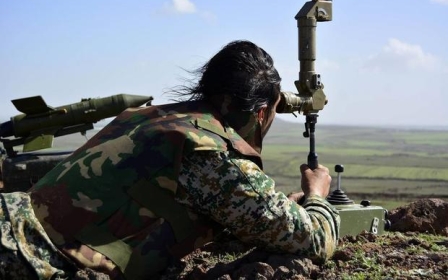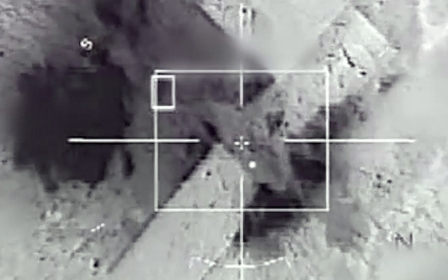ANALYSIS: Syrian opposition share vision, but lack unity in the fight against Assad

The Syrian opposition is meeting in Saudi Arabia between 8 and 10 December in an attempt to create a unified structure that can credibly sit across the table from the Bashar al-Assad government in the internationally organised peace talks in Vienna, and make a binding commitment on the path forward for Syria.
A minor stir has been caused by the exclusion from the conference of the Kurdish Democratic Union Party (PYD), the Syrian wing of the Kurdistan Workers' Party (PKK), which will now hold its own conference on Syria's future in Rmeilan, in north-east Syria, on 8 and 9 December. The PYD must be included in talks over Syria's future, but the PYD's political vision is not in accord with the largely Arab opposition and its inclusion in Riyadh would have assured failure.
The attendees will include 40 figures from the Syrian National Coalition of Revolutionary and Opposition Forces (ETILAF), including its president Khaled Khoja. ETILAF is the political opposition, recognised by numerous states, notably in the West and the Arab world, as the legitimate representative of the Syrian people.
Thirty-six "independents," including old secular oppositionist figures and Muslim Brotherhood members, will be in Riyadh. And finally there are 12 representatives from the National Coordination Committee and two from the Building the Syrian State movement, both regime-tolerated opposition movements.
There are also 15 armed opposition groups represented at the Saudi conference. Most of these groups are unambiguously part of the Free Syrian Army (FSA)-branded revolutionary movement, labelled as moderate by Western governments, but some are more conservative Islamists.
The armed opposition in Riyadh
The Southern Front is attending the conference. The umbrella group combining most of the FSA-style insurgent groups in southern Syria, the Southern Front is closely connected to the US-supported, Jordan-based Military Operations Centre (MOC) that has provided support to the Syrian opposition.
Attending from the north are several smaller FSA-branded rebel groups that have been vetted by the Turkey-based operations centre (known by its Turkish acronym, MOM), notably Furqat al-Oola al-Sahiliya (The First Coastal Division) and Liwa Suqour al-Jabal (The Brigade of the Mountain Hawks), the latter of which has become prominent for its effective use of TOW anti-tank missiles. Also present is Kataib Nooradeen al-Zangi, a larger FSA-style group based in western Aleppo that has been vetted by the MOC.
There are then several more conservative groups in attendance, which have sometimes fought in battlefield alliance with al-Nusra Front, al-Qaeda's Syrian branch, but which do not share al-Nusra's ideology and are very much in the mainstream of the Syrian insurgency. One such group, from northern Syria, is Faylaq al-Sham (Sham Legions), which began as effectively the armed wing of the Muslim Brotherhood, but which has incorporated new factions and further moderated over time.
Other such groups are: Jaysh al-Mujahideen, which formed in Aleppo in January 2014 to lead the opposition's uprising against the Islamic State (IS); Jabhat al-Asala wal-Tanmiya (The Authenticity and Development Front), a Salafist organisation with extensive Gulf ties; and al-Ittihad al-Islami li-Ajnad al-Sham (The Islamic Union of the Soldiers of Sham), a Damascus-based group deeply tied to the local clergy.
Finally, there is Jaysh al-Islam (JAI) and, most significantly, Ahrar al-Sham.
JAI, based in the eastern suburbs of Damascus, would be - with the Southern Front - one of the groups well-placed to take the capital if the regime fell. Backed by Saudi Arabia, JAI vies with Ahrar al-Sham for the position of largest rebel group. JAI's leader, Zahran Alloush, is unable to attend the conference because of the government's siege of his area, but has instead sent representatives. JAI has fought alongside al-Nusra, though much less recently, and Alloush's public statements have included - at times when radicalism was in the ascendancy - vicious sectarianism. But "on a fighter-by-fighter level [JAI is] a much more moderate Islamist organisation," as Charles Lister of the Brookings Institute has put it.
Ahrar al-Sham is different from JAI, a much more disciplined organisation in terms of its ultra-conservative Salafist ideology. A close battlefield ally of al-Nusra that always rejected the FSA brand, and containing within its leadership structure several al-Qaeda veterans, Ahrar has heretofore been regarded, despite a top-down public moderation, as an organisation to be shunned by the West and by many regional powers, Saudi Arabia specifically, though not Qatar and Turkey. Previously, the Saudi-Qatar/Turkey rivalry has torn apart rebel coordination initiatives, but the heightened Russian and Iranian intervention in Syria has changed this, placing the primary focus on unity and lessening the Saudi antagonism to Ahrar al-Sham.
At the 15 November Vienna meeting, the communique representing both government-allied and rebel-allied states made reference to drawing up a "common understanding of groups and individuals for possible determination as terrorists". Iran and Russia were pressing very hard to have Ahrar al-Sham placed on this list. The Saudi invitation to the group is a firm push-back against that proposal, and perhaps the most significant outcome of this conference.
What can be achieved?
The prospects for forming a genuinely representative opposition "team" under a single line of command are slim, and the prospects of that representative being able to enforce any agreement it might make are slimmer still because the regime and its supporters are not minded to make, let alone abide by, any such agreement.
The conference is "certainly an improvement on previous conferences in that it's invited more rebel forces that actually represent those on the ground," Hassan Hassan, an Associate Fellow at Chatham House and co-author of ISIS: Inside the Army of Terror, told Middle East Eye. But the "pessimism about the conference is a product of the desperate reality on the ground," where the prolongation of the conflict and the intervention of Russia has made the situation more intractable, Hassan added.
"Despite what Western officials say, the differences between the two warring sides are deepening and no political agreement is in sight."
Whatever the outcome in Riyadh, the Vienna process is very unlikely to end the war in Syria. Any political settlement would require that Assad step down so the rebels could be freed from regime attacks to move against IS in alliance with an interim government. But Assad's supporters have made clear they will not allow him to be removed, and the anxiousness for an agreement is leading the US to move closer to this position.
Secretary of State John Kerry has suggested that the rebels could combine with the Syrian army before Assad's exit to attack IS, which no rebel faction will do, and US officials have been pressing the opposition and its backers to adopt "creative language" about Assad's fate, i.e, not to set too unambiguous a timeline on his departure.
Whether or not the rebellion can put together a unified representative it does have a relatively unified vision, and it will firmly reject any process that it sees as entrenching the Assad government.
New MEE newsletter: Jerusalem Dispatch
Sign up to get the latest insights and analysis on Israel-Palestine, alongside Turkey Unpacked and other MEE newsletters
Middle East Eye delivers independent and unrivalled coverage and analysis of the Middle East, North Africa and beyond. To learn more about republishing this content and the associated fees, please fill out this form. More about MEE can be found here.




